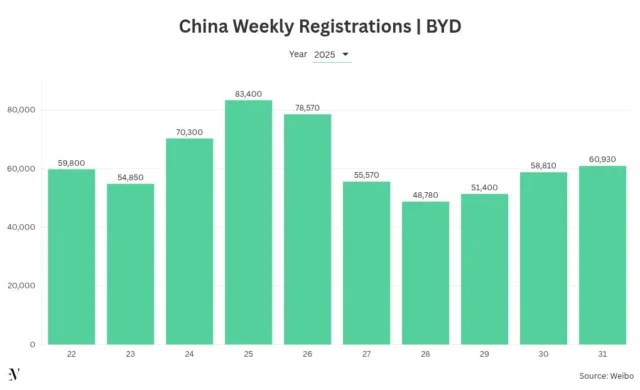China’s giant BYD sold 60,930 vehicles from July 28 to August 3, vehicle registration data shared on Chinese social media showed this Tuesday.
Figures rose slightly by 3.6% from the previous week’s 58,810 units, surpassing 60,000 units for the first time since the last full week of June.
Between January 1 and August 4, the Shenzhen-based company sold nearly 1.7 million vehicles in its domestic market.
Regarding new energy vehicle brands (NEV) in the country, the company leads the market and is followed by Geely‘s Galaxy, which registered over 23,000 vehicles last week, and US brand Tesla, which listed 11,000 units.
BYD and Galaxy sell both hybrid and fully electric models, while Tesla only offers fully electric models and at a considerably higher average selling price.
Stellantis-backed Leapmotor registered 10,200 vehicles in the country, and Huawei-backed Aito sold 9,600 units. XPeng and Xiaomi listed 9,100 and 7,600 units, respectively.
In the premium segment, Zeekr registered 2,900 vehicles, while its competitor Nio brand sold 3,450 EVs.
The Shanghai-based company announced on Tuesday that its Onvo L90 model ranked third in large-sized SUV sales last week, just below Aito‘s M8 and M9.
BYD‘s Denza N9 was the ninth best-selling model in the segment.
Last Friday, BYD announced it delivered 344,296 vehicles globally in July, posting the first sequential decline since the year began. The figures were down 10% from June’s 382,585 units.
Of the total, 341,030 were passenger vehicles, including 177,887 battery electric vehicles (BEVs). BEV sales continued to outperform plug-in hybrid (PHEV) volumes, for the fourth consecutive month.
Deliveries overseas continued to rise year over year. The figures were up from 30,000 to 80,700 vehicles.
However, registrations also declined from the 90,049 units recorded in June, breaking a seven-month record.
Late last month, BYD said that it is still on schedule to begin production at its first European passenger vehicle factory by the end of this year, after Reuters reported that the company was delaying the beginning of operations to 2026.
The Chinese brand told media outlet Global Times that its “strategy in Europe is long-term” and that the project “remains on track to start production by the end of the year.”
The company invested over $4 billion in the factory, located in Hungary, where it also established its European headquarters earlier this year.








